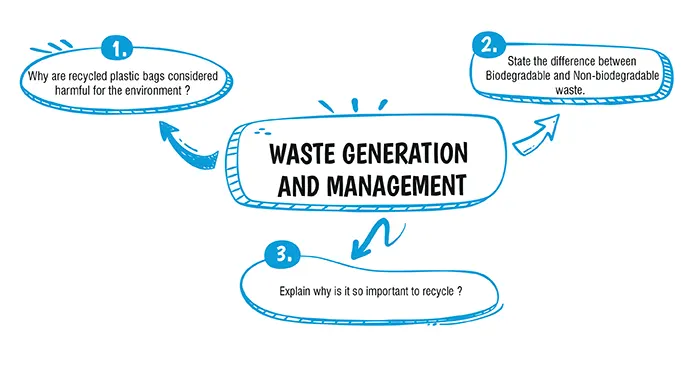Table of Contents

Ans. (d) All of the above
Explanation:
The sanitary landfills have following advantages:
• The waste products of landfills can be used as direct fuel for combustion.
• The location of waste deposition in the landfills is monitored.
• After the landfills are completed they can be used as parks or farming land.
• Landfills are free from pollution and burning.
Ans. (b) Nagpur
Explanation:
The National Environmental Engineering Research Institute (NEERI) is situated in Nagpur.
Explanation:
Plastics are recycled by plastic manufacturers. Plastic is non-biodegradable. The bonds of carbon in plastic are impossible to break down through a physical or chemical process. They have to be incinerated, recycled or buried in landfills. The plastic bags which are extensively used in India are made from recycled plastic. The recycled plastic bags are harmful because the melting of plastic and plastic products breaks some polymer chains into smaller units which are harmful for our environment as well as human beings.
Explanation:
Difference between biodegradable and non-biodegradable waste
Biodegradable :
The biodegradable waste breaks down and decomposes by microorganisms like bacteria and fungi in the soil. e.g., Wood, Paper, etc.
Non-biodegradable :
Non-biodegradable waste includes that material which does not break down or decompose in the soil. e.g., Plastics, Poly Bags etc.
Explanation:
Recycling is important for several reasons :
(i) Recycling conserves natural resources.
(ii) Recycling conserves landfill space.
(iii) Recycling employs people.
(iv) Recycling conserves energy.
(v) Recycling reduces our dependence on overseas natural resources.
| Chapter No. | Chapter Name |
|---|---|
| Chapter 1 | Map Study: Interpretation of Topographical Maps |
| Chapter 2 | Map of India |
| Chapter 3 | Location, Extent and Physical features |
| Chapter 4 | Climate of India |
| Chapter 5 | Soil Resources |
| Chapter 6 | Natural Vegetation of India |
| Chapter 7 | Water Resources |
| Chapter 8 | Mineral and Energy Resources |
| Chapter 9 | Agriculture In India |
| Chapter 10 | Industries in India: Agro Based |
| Chapter 11 | Industries in India: Mineral Based |
| Chapter 12 | Transport in India |
| Chapter 13 | Waste Generation and Management |
CBSE Important Questions Class 9
CBSE Important Questions Class 10
CBSE Important Questions Class 12
CBSE Practice Papers
CBSE Practice Papers
ICSE Important Questions Class 9
ICSE Important Questions Class 10
ICSE Practice Papers
ISC Important Questions Class 12
ISC Practice Papers
Contact Us
© Copyright 2024 oswal.io by OSWAL PUBLISHERS Simplifying Exams